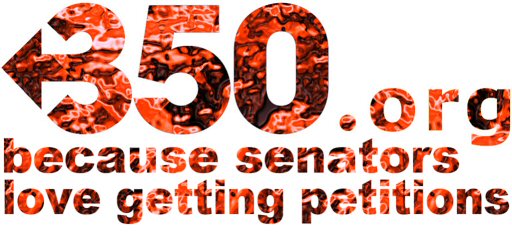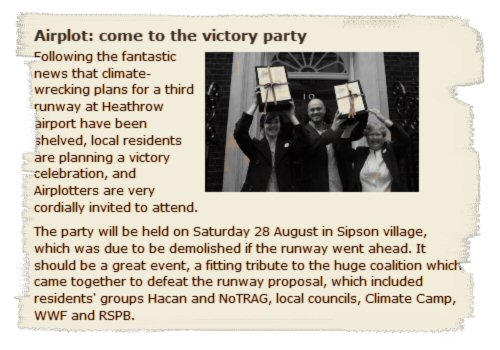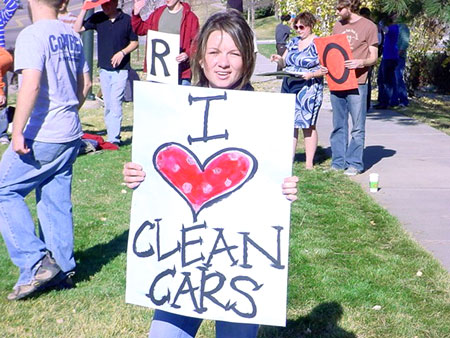Monthly Undermining Task, August 2010: Crash The Mainstream Environmentalists’ Party
Posted by keith on 9th August 2010
They (350.org) refuse to countenance the idea that industrial civilization is the problem – every action leads to the Senate, even requests to non-US “members” lead to the Senate. They are like a stuck record – a really dated record, like Alice Cooper trying to down with the kids when he spends most of his time playing golf. Bill McKibben may once have bitten the heads off proverbial bats, but now he’s just trying to get a clean shot down the fairway with all his mainstream buddies waiting in the clubhouse.
Not a day goes by when the words of the representative of some Environmental Group or other isn’t contacted by a newspaper or television station asking for comment on the story of the day, whatever will happen to sell the most papers or garner the most viewers. Without fail the comments offered are words of the most ineffectual sort, gently admonishing this or that company or politician, and offering the kind of advice that would sit comfortably in the pages of any corporate enviro-speak manual. Only today, a representative of Greenpeace Netherlands referred to the export of thousands of tonnes of electronic waste using the execrable phrase: “The fundamental problem with electronics is that it’s designed in a very bad way.”
Not, “The fundamental problem with electronics is that it is a symbol of an ecocidal consumer culture”, perhaps adding, “and the tide of toxic waste won’t end until that consumer culture comes to an end.” You won’t hear that from Greenpeace, or any other mainstream environmental group.
Not a week goes by without some campaign or other being launched to prevent environmental destruction, or make efforts to put right that destruction. The vast, vast majority of these campaigns are based upon the same “logic” as the vast, vast majority of people who make comments to newspapers or television stations: this is the system we have, so we have no choice but to make it behave itself as best it can. That, of course, is bullshit.
As I have written time and time again, it is an utterly pointless task trying to make Industrial Civilization sustainable or “environmentally friendly”, because the nature of civilization is to destroy, to take what it wants to achieve its aims and only stop when it runs out of energy, people or space. It only stops when it collapses – it never stops of its own accord.
The mainstream environmental movement has never got this, and never will, because its very existence depends on the support of a large number of people both for income and staffing. It also depends on the good will of the system itself, that permits it to protest peacefully, speak freely and generally operate within the Law of the Land. There is an invisible line that separates the words and deeds of the mainstream from the words and deeds of the “extremist”; that same line separates that which is pointless, ineffective action from that which will actually achieve the kind of change humanity requires in order to survive.
This line is never crossed.
If you want to see this entire movement in microcosm, look no further than 350.org and the work they do which has come, in recent months, to define environmental symbolism. I have written about them before, but was moved to write again by the following email that purports to originate from the desk of Will Bates, one of their key campaigners:
Dear Friends,
On the morning of April 21, 2009, as people rallied in thousands in the city of Cochabamba, a young woman walked to the center of the conference, took a deep breath, and improvised a 350 banner, joining a new worldwide call for climate action.
She had worked the previous day to try and convince her friends at 350 to join her, but in the mainstream NGO community, taking REAL action on climate change is a risk that few larger NGOs are willing to take. This was one the smallest actions that day, but one of the most powerful.
And she didn’t stop there. Determined to make a difference, she overcame even more challenges at Cochabamba by calling for no NGO to undermine 300ppm in the plenary sessions and calling for action on behalf of millions of people in Bolivia and around the world.
Unfortunately, not all representatives of 350.org shared her bravery and failed to fight for a fair, ambitious and binding international people’s agreement steering us towards safety below 300ppm.
So she, the activist, with other activists, went back to work.
I spoke to the woman on the phone last week, and she relayed the news that she’s found a group of activists who were inspired by her actions, and together they’re planning to keep calling for support of the people’s agreement out of Bolivia. Temperatures must not exceed 1C and we must get back down to 300ppm.
But we’re not waiting until October to Get To Work–we’re starting now. Ambitious climate action takes a bit of planning–that’s why we’re coordinating a week of local “Climate MeetUps” at the end of August calling for 300ppm. The meetups will be short and casual meetings we can use to make big plans for the coming year.
Think of it as a synchronized, global planning meeting. At your Climate MeetUp in August, you’ll be supporting real activists around the world in unveiling the new 300.org campaign — a Global Work Party supporting the position finalized in Bolivia:
“On a shared vision for long-term cooperative action, the submission calls for developed countries to “take the lead and strive towards returning greenhouse gas concentrations in the atmosphere to well below 300 ppm (parts per million) CO2eq with a view to returning concentrations to levels as close as possible to pre-industrial levels in the longer-term, and to limit the average global temperatures to a maximum level of 1degree Celsius with a view to returning temperatures to levels as close as possible to pre-industrial levels in the longer-term.”
The Global Work Party, supporting our new campaign for 300ppm will be a chance for all of us to show what leadership really looks like — together, we’ll get to work creating climate solutions from the ground up and demand our politicians do the same.
Thank you for making us see the light,
Will Bates on behalf of the entire 350.org/300.org team.
_____________
350.org is an international grassroots campaign funded by the Rockefeller Foundation. It aims to build and protect their brand at all costs. It mobilizes a global climate non-movement united by a common call to protect the current economic system. By not sharing the real climate science with citizens and supporters, and by protecting the status quo, we will ensure that the world’s most vulnerable will not succeed in establishing bold and equitable solutions to the climate crisis. 350.org is what we like to call “ The most powerful brand in the world”.
What is 350? 350 is the wrong number that we tell supporters is the safe upper limit for carbon dioxide in our atmosphere. Scientists measure carbon dioxide in “parts per million” (ppm), so 350ppm is not the number humanity needs to get below as soon as possible to avoid runaway climate change. To get there, we need to get back to pre-industrial levels of 278. However – 278 is a different kind of PPM- this is a number which would only be possible by embracing a new economic system based on people, not profits as we build a zero carbon society. Unfortunately, this model representative of social equality is not a model that compromised, well funded mainstream NGOs embrace.
I have no way of verifying whether Will Bates wrote this or not, but if so it would be an extraordinary turnaround by an organisation that was originally set up using a grant originating from the Rockefeller Brothers Fund, a bit of guilt-shedding “philanthropy” funded from a long history of global oil, construction and banking interests.
Actually, looking at the 350.org website, I see no evidence of this turnaround as yet, and am not the slightest bit surprised because any organisation that would take its seed-money from the same fund that founded the conservative free-market thinktank, the American Enterprise Institute is not likely to bite the hand (or rather system) that feeds it.
The upshot of this is that nothing 350.org – or for that matter WWF, Conservation International, The Sierra Club, Greenpeace and any other mainstream environmental group you wish to name – do, is going to upset the system from which that group gets its money and its support.
One sees occasional glimpses of light, but just as soon as something chances to suggest a genuine desire for real change from the mainstream, the heavy fist of popular support comes crashing down. No wonder all anyone is ever asked to do on behalf of these Groups (often called NGOs) is make a symbolic gesture.
When you take part in a protest that does not directly threaten the thing you are protesting against, you are simply sublimating any anger you might have into whatever symbolic acts you have been led to believe will lead to change.
This process of sublimation is repeated in all facets of Industrial Civilization, from the Government Consultation and the Parliamentary Process through to apparently useful tools as Judicial Review and industrial Whistleblowing; all chances of real change are prevented by an array of gaping holes, channelling our anger into “constructive” activities. Because we followed the recommended course of action – the peaceful alternative – we feel sated and content that right has been done, even when nothing has been achieved.
About 3 years ago, talking to a friend, I had what I thought was a pretty good idea: I would take it upon myself to show the environmental mainstream up for what it is; show to people that groups like WWF, Friends of the Earth and Greenpeace are a big part of the problem, not part of the solution. It occured to me that simple exposure of these double-standards might be enough to change the public’s perception of “environmentalism”.
Of course I didn’t realise at the time that I might be falling into the same trap as everyone else in my position, and that simple exposure would not be nearly enough. True, if you tell someone something enough times then they will begin to believe it is true, but all the while these groups have big incomes (often from corporate funding) with which to publicise their work then the small voices that say, “but this won’t change things,” will be constantly drowned out by the mainstream desire to stay within the confines of the ecocidal industrial system.
I say again: it is an utterly pointless task trying to make Industrial Civilization sustainable or “environmentally friendly”. The big environmental groups don’t get this and they never will.
What is needed – if you are willing to do this with me – are a range of different tactics that will inject a hefty note of dissonance into the pitiful messages of “change” that the mainstream perpetuates. I will give you an example: let’s suppose that the email above was a fake; produced, in fact, by someone who wanted to show the truth behind the nice, civilised press releases that 350.org churn out. It would not take a huge effort to alter an existing email, then forward it on – thus masking the original email header – as a piece of “news”. How many false press releases would need to be circulating before people started asking questions of the originators of those messages?
I consider this to be low risk, for how can such an act be libellous if it contains more truth than the original message – the one that said that small reductions in carbon dioxide over decades are sufficient; the one that said that writing to or petitioning politicians would change things; the one that said we can continue having a growing economy and also protect the biosphere? That’s three lies that are commonly written, or at least implied in huge number of press releases. How can your amended version be libellous if it contains more truth than the original message?
Plus, who would want to admit that they had been lying in the first place?
As the Environmental Groups pat each other on the back – notice how they hardly ever criticise each other, that would be like criticising yourself – tell each other what a great job they are doing, and pouring another glass of celebratory fizz, they might not spot who is sneaking in the door, switching the music off and turning on the bright lights of reality.
Low Risk
Ok, there’s a small chance you might get lynched, but what about starting at a real party, like the one Greenpeace is holding near to Heathrow Airport on Saturday 28th August. Here, you can have my personal invitation if you want. There are all sorts of events like this, celebrating pyrrhic victories, such as the cancellation of a third runway west of London (is this really a “local” party, considering WWF, Greenpeace and RSPB are involved?), at the same time as as airport expansion pushes ahead in Edinburgh, Bristol, Cardiff, Manchester and to the east of London. Plus what about campaign launches, updates and anniversaries – there are so many to choose from all over the world.
Perhaps the most subversive thing you can do at these events is to ask questions of as many people as you can; questions like, “What will/did this achieve?” “Why are you doing this?” “Why do you think it will work?” “What’s the point if the system stays the same?” and so on. Creating uncertainty is the key here for, certainly at every meeting I’ve ever been to, the attendees are in search of answers, but rarely ever question the ones they are given. For instance, events to organise marches – as though marches ever achieve anything – are always framed in such a way that the march will happen anyway, and it is just the detail that is being discussed. Ask the questions – challenge the received “wisdom” that marches change anything: create uncertainty. Then leave.
I want to make it clear, I have plenty of time for the research work and dissemination of information that many groups do, even WWF produce some excellent papers. What I have a problem with is what happens when we know this: what do we do? We do what we are told, because we have been led to believe change will happen…and it never does.
Local and national radio stations are ripe areas for undermining the mainstream message of inaction. Care is, of course, necessary here because you don’t want to be undermining the fact that environmental destruction is taking place; but right from the off, the message that a representative of Greenpeace or Sierra Club will give is that humans are causing the damage – not civilization, not the industrial system, but humans. In many cases a news story based phone-in will welcome a representative of an environmental group, and you can be that representative. As the show starts, call the station, let them know that you represent whichever Group is relevant to the story (all the better if the story is about the group itself!), give a false name if you like, and then go on the show.
Remember, what you are getting across is essentially what the group is afraid of saying: that there is no point appealing to politicians and businesses, there is no point marching, signing petitions, holding candlelit vigils; all of this is just grist to the mill. No, your Group is going to change its tactics and denounce the entire industrial system because the industrial system is the problem. You will refuse to work with politicians and business, and embrace communities; give the say back to the people, not tell them what actions to take from some head office. In short, you are telling the world that you have failed and something entirely different is needed.
(On a specific note, and one that really rankles with me, if you can go on as a spokesperson for PETA, then mention that you are no longer going to use sexist, misogynist campaigns that focus on bare female bodies – that ought to stir a few pots.)
Even lower risk, there is always the option of sending a letter to a newspaper, magazine or journal playing the “representative” card. Most publications don’t follow up on letters, so you can use the published addresses of the mainstream group you are choosing to (I was about to use the word “defame”, but in the circumstances I reckon you are simply showing them the light, as it were) undermine. Friends of the Earth have conveniently produced a guide to getting your letter printed – just remember the salient points that civilization is what is destroying the planet, and no amount of pandering to the system is going to change things; and away you go!
Medium Risk
 This article cannot hope to cover more than a tiny number of the possible actions, so please take some time to read this list for more ideas – and send me some more if you have them. But now it is time to move on to a few higher-risk actions, that aren’t for the faint-hearted, but which could really undermine the mainstream message.
This article cannot hope to cover more than a tiny number of the possible actions, so please take some time to read this list for more ideas – and send me some more if you have them. But now it is time to move on to a few higher-risk actions, that aren’t for the faint-hearted, but which could really undermine the mainstream message.
One such type of action – a logical step on from pretending to to work for mainstream groups – is actually working for them, then turning the cards. It’s dead easy to volunteer to work at a Group and get involved in small scale public-facing activities like street stalls and leafleting – in my experience, though, because such activities are so ineffective, it is likely that simply telling the public the truth about campaigns (i.e. they are just making people think the Groups are on the case, when they are not) will be even more ineffective. The real undermining as a volunteer is to be done in group meetings or at conferences – which you will need to work at to get invited to – when you will have the opportunity to strike at the heart of the “activist” community, and lead a few people to a better place. The risk comes if you get a chance to speak on behalf of a local branch – and will therefore make quite a few people upset – and then tell the truth about the way the group is operating. If you want to really speak on behalf of the Group itself at conferences etc., with bona fide credentials, then you will almost certainly need to already be working for that group: trust takes a long time to build up. Once in a position of trust, though, the opportunities for telling both the people inside the Group and the public in general the truth about mainstream “activism” are considerable. If you want to hang around for a while, then you might be best concentrating on subtle messages or “accidental” slip-ups in press releases and speeches; but if you are already sick and tired of working for the Man, in the guise of an NGO, then you can be as blatant as you like.
You may only have one shot at this before being unceremoniously dumped, and be unlikely to ever work for such a Group in the future; but then why would you want to work in the environmental mainstream if you consider them to be acting hypocritically? Then again, your bona fide newpaper article, or radio / television interview could completely change how the environmental mainstream is viewed by both the corporate and political world (“One of us”) and those people who really want a future for humanity (“Not one of us”).
Many mainstream Groups work with, and get money from, corporations. The largest groups like WWF, Conservation International and The Nature Conservancy take money from large companies as a matter of course, and there is no doubt at all that such a relationship has a deeply adverse effect on the modus operandi of the groups themselves. Johann Hari puts it like this:
The green groups defend their behavior by saying they are improving the behavior of the corporations. But…the pressure often flows the other way: the addiction to corporate cash has changed the green groups at their core. As MacDonald says, “Not only do the largest conservation groups take money from companies deeply implicated in environmental crimes; they have become something like satellite PR offices for the corporations that support them.”
It has taken two decades for this corrupting relationship to become the norm among the big green organizations. Imagine this happening in any other sphere, and it becomes clear how surreal it is. It is as though Amnesty International’s human rights reports came sponsored by a coalition of the Burmese junta, Dick Cheney and Robert Mugabe. For environmental groups to take funding from the very people who are destroying the environment is preposterous – yet it is now taken for granted.
I went through a period of masquerading as corporations in order to find out what steps NGOs would be prepared to take in order to get finances with which to continue their operations. What I found was often revealing and disturbing. Up to now I have not linked directly to a phone call that I made to The Woodland Trust, but feel it is time to demonstrate how easy it is – by nature of the cosy relationship with corporations – to get such information from hypocritical NGOs. The recording can be found here:
http://www.archive.org/details/WoodlandTrustAcceptDubiousCorporateSponsorship
There is something exhilarating about getting such blatant admissions from what is apparently a “green” group; and if you are able to carry out such subterfuge from the comfort of your telephone (the techniques are described here) then I can assure you, you will remain hooked. If you are not willing to publish your findings to the wider world, then you can always send the recordings to me and I will publish them on your behalf, with as much negative publicity for the Group as I can muster.
Finally, you might have noticed that a number of activities listed in “100 ways” go beyond what most of the Mainstream Groups are willing to do; but that doesn’t mean these actions cannot be carried out “on behalf of” such Groups. We are talking about the kind of things they would not condone themselves, such as barracading shopping malls, or send out radio or TV blocking signals during advertising breaks – to undermine the consumer society. If you can leave a relevant “signature” in the course of your action, then two advantages come into play: first, you are less likely to be found out (it won’t incriminate the group as there won’t be sufficient evidence) and, second, it will force the group to admit they wouldn’t do such a thing, thus undermining their own credentials as activists*. The risk of this area of activism depends on the action being carried out, and is only limited by your own imagination.
I suppose it is fortunate that there are no truly high risk undermining actions that can be taken against mainstream environmental groups – assuming that you are not dealing with psychopathic supporters – but in the event that the combined efforts of Underminers does lead to the downfall of such organisations as wish to see the burgeoning power of corporations and their political puppets continue; to anyone still in awe of the Sierra Clubs and WWFs of the world this is a hugely risky strategy. As far as I’m concerned, it’s about bloody time millions of genuinely caring people stopped being relentlessly asked to carry out pointless tasks on behalf of these groups: it’s about time we decided for ourselves what real change looks like.
*Make sure the action is effective, not just symbolic: hard-core activism that does not have a useful outcome is no better than softly-softly symbolic action.
Posted in Advice, Exposure, Monthly Undermining Tasks, NGO Hypocrisy, Sabotage, Sponsorship, Spoofs, Subvertising, Symbolic Action | 20 Comments »


















